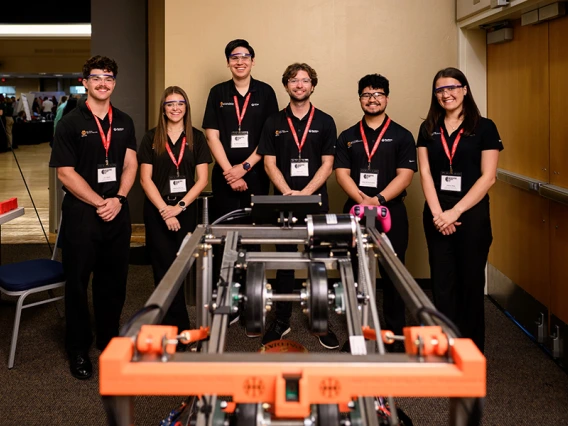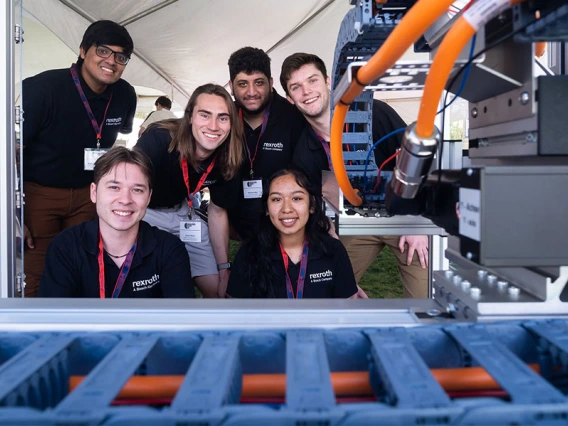Golf-putting robot sinks an ace at Design Day 2025
University of Arizona engineering students competed for $51,000 in prizes, with projects ranging from the winning golfing robot to a severe burn patient flotation tank and an artificial intelligence-powered phone application.
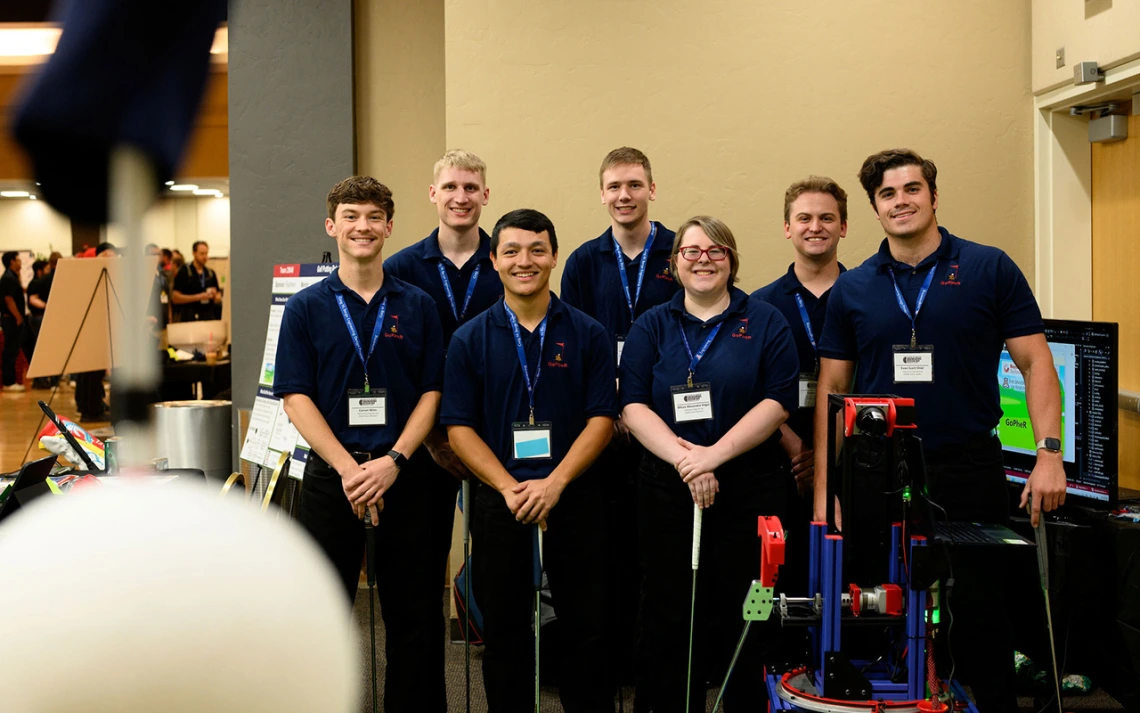
Team 25048’s golf-putting robot Gopher combines the fun of sports and the power of engineering to swing a hole-in-one with two shots or fewer.
As clouds gathered over Tucson, excitement built among thousands of attendees – including members of the public, local high school students, and industry judges – at the College of Engineering’s 2025 Craig M. Berge Design Day.
The annual event is an opportunity for engineering seniors to present the results of their yearlong capstone class in the Student Union Memorial Center ballroom and on the University of Arizona mall. Students from majors across the college made up 79 multidisciplinary teams that completed projects requested by industry and university sponsors.
Students had two semesters to design, prototype and test their projects to compete for $51,000 in prizes on May 5. This year, the teams persevered through novel challenges to improve the human condition.
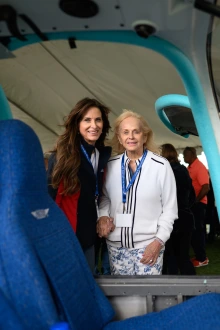
Barbara (left) and Nancy Berge check out Team 25004’s Airplane Fuel Selector Valve Control for Armless Pilots.
“Design is at the heart of being an engineer,” said David W. Hahn, Craig M. Berge Dean of the college, to open the award ceremony. “As I walked around today, I saw some amazing projects and mostly, engineers who are proud of their accomplishments.”
Provoking curiosity in STEM
The $7,500 top prize, the Craig M. Berge Dean’s Award for Most Outstanding Project, went to Team 25048 for Gopher, a golf-putting robot. Its goal: to demonstrate engineering concepts in a way that inspires K-12 students to consider pursuing careers in the engineering field.
This is the second year in a row a team sponsored by Raytheon, an RTX business, has won first prize.
Team members took Gopher to Catalina Foothills High School and Sahuaro High School before Design Day presentations. The robot sparked interest with its autonomous and manual features, but team member MiLee Vogel was most excited to demonstrate the latter.
The software engineering senior connected the robot’s mechanical components to an Xbox controller and screen, enabling the user to manually control the robot and precisely line up each shot.
“I love being able to design what you see on the screen and make something happen with tech,” she said. “That probably comes from my love of video games.”
In addition to playing with Gopher’s high-accuracy putting, the high schoolers were introduced to the engineering process.
“We also walked them through our design process of getting a product from A to Z, because I had never been exposed to that process until this class,” said team lead Evan Shiel, an industrial engineering senior.
Medical projects offer meaning and training
Multiple teams developed tools that harnessed diverse engineering disciplines to improve medical care.
Team 25052 prototyped a suspension bath for severely burned or injured patients. Sponsor Roy Medina tasked the team with creating a more comfortable solution for long-term hospital patients. Burn patients typically heal in firm beds, which are uncomfortable, said Joshua Capel, project procurement lead and electrical and computer engineering senior.
“Any sort of friction or pressure on a patient’s wounds is painful. Suspending them in fluid means less pressure and less friction on their wounds, and we can introduce medication directly into the fluid,” he said.
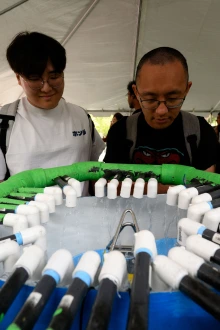
Team 25052's flotation tank incorporates sensors that continuously monitor the fluid surrounding a patient.
Capel programmed the microprocessor, which enabled the tub’s sensors to read data and display the results on a digital monitor. He also integrated an alert system that activated if the fluid’s pH or temperature went out of range.
“A biomedical project wasn’t something I had done before, so I wanted to step outside my comfort zone. Helping people heal was really meaningful to me,” he said, adding that many of the skills he used in this project will directly translate to the workforce. Capel landed a job as a systems engineer at Textron Systems in Maryland.
Another team employed artificial intelligence to improve medical care in developing countries.
Sponsor Global Medic Force – a nonprofit organization that sends volunteer medical experts from Western nations to train health care workers in developing countries – asked Team 25033 to create MD-Sensei, an AI-powered smartphone application that delivers science-backed clinical guidance based on thousands of medical documents.
The team trained a large language model to feed the app’s AI chatbot with medical documents provided by the sponsor’s volunteer doctors. When prompted, the chatbot creates a summary of relevant medical research based on the user’s request.
“The same code base works on IOS and Android phones, and we made an administration website where doctors from our sponsor can manage the system and view answers the AI is generating,” said team member Oliver Seymour, a software engineering senior.
MD-Sensei's AI model not only interprets the meaning of a user's questions and provides corresponding information, but it can also give information specific to language and country, if requested.
Seymour’s team won The Mensch Foundation Award for Best Use of Embedded Intelligence.
“This is something that will be used in remote areas, and the sponsor wants a medical doctor that may not have available training to have access to an AI that may be able to help them and fill gaps,” said team member Cameron Brown, a software and systems engineering senior.
Mining solutions lead to novel applications
Caterpillar sponsored Team 25036, which came in third during the awards ceremony, winning the RBC Sargent Aerospace & Defense Voltaire Design Award for the Hydraulic Mining Shovel Panel Re-Design with Adhesive Bonds.
The team reimagined the connection between the slew ring cover – a critical component of a hydraulic mining shovel that helps it rotate smoothly – and the slew ring with acrylic adhesives as an alternative to welding techniques, which causes metal to distort.
And Team 25062’s Underground Mine Design project took home $1,500 for winning the Lundin Award for Innovation in Mining. Sponsor Resolution Copper asked to the team for a modern drill and blast draw bell design that prioritized underground mine safety and cost-effectiveness.
Craig M. Berge Design Day 2025 Winners
Craig M. Berge Dean’s Award for Most Outstanding Project – $7,500
Team 25048: Golf Putting Robot
Alex Choi, Davin Schlak, Matthew Schultz, MiLee Alexandra Vogel, Carson Winn, Evan Scott Shiel, Tyler Wilson
Project Sponsor: Raytheon Technologies
Raytheon Technologies Award for Best Overall Design – $5,000
Team 25004: Airplane Fuel Selector Valve Control for Armless Pilots
Mason Marrero, Abdulaziz Alrandi, Luis Barnett, Hunter Fiore, Natasha Oler, Anja Ziegler
Project Sponsor: Rightfooted Foundation/Craig M. Berge Dean’s Fund
RBC Sargent Aerospace & Defense Voltaire Design Award– $3,000
Team 25036: Hydraulic Mining Shovel Panel Re-Design with Adhesive Bonds
Ahmed Ayad Al Mohammed, Joseph Aumick, Dante' Dixon, Emma Geneve Miller, Camden Nelson, David Rumph, Musab Ali
Project Sponsor: Caterpillar, Inc.
Acron Aviation Award for Most Robust Systems Engineering – $2,500
Team 25060: Local Hypothermia in Spinal Cord Injury
Anna Lucille Fravel, Janna Said, Makena Verdugo, Jesus Ivan Zazueta, Darya Pershina, Amir Sobhan Haghiri
Project Sponsor: Biomedical Engineering/College of Medicine – Tucson
BAE Systems Award for Best System Software Design – $2,500
Team 25025: Automated Slide Transfer
Andres Galvez, Carson McDaniels, Derek Tien Nguyen, Alex Romero-Lozano, Sebastian Saucedo Alcantar, Kerwin Dewberry Jr, Aaliyah Thompson-Mazzeo
Project Sponsor: Roche Tissue Diagnostics
Honeywell Award for Excellence in Aerospace System Design – $2,000
Team 25059: Design, Build and Fly a Modular UAV for Autonomous Flight Tests
Cougar K Bellinger, Teegan Cook, Cooper L Dickerson, Logan Stonehouse, Unai A Urreiztieta, Tyler Cook, Adam El Houmaidi
Project Sponsor: Aerospace & Mechanical Engineering
Bly Family Award for Innovation in Energy Production, Supply or Use (First Prize) – $2,000
Team 25054: Hybrid Electric Retrofit Demonstration for a Drilling Rig
Ahmad Fahad AlKhezzi, Steven Crellin, Alicia Marie Diaz, Thuan Nguyen, Matthew Wright, Zeah Zimpleman, Kira McKay
Project Sponsor: Geomechanics Southwest, Inc./Nobel
Bly Family Award for Innovation in Energy Production, Supply or Use (Second Prize) – $1,000
Team 25032: Solar Performance Estimation Kit (SPEK)
Kari Cordes, Jacob Duran, Sebastian Alexander Longoria, Hannah Alexandra Spallas, Matthew Wasko, Jack T Hughes, Natalie Barnhouse
Project Sponsor: General Dynamics Mission Systems
Roche Tissue Diagnostics Award for Most Innovative Engineering Design – $1,500
Team 25013: CASA Device for Carpal Tunnel Syndrome Treatment
Ali Alrashidi, Brooklyn Fremin, Allen Z Lin, Ryan Henry Walton Mitstifer, Alex Moncada, Eric Pineda, Sabina Romero
Project Sponsor: College of Medicine – Tucson
School of Mining & Mineral Resources Lundin Award for Innovation in Mining – $1,500
Team 25062: Underground Mine Design
Thomas Gage Buza, Carolina Gamez Gonzales, Casandra Gamez Gonzales, Evamarie Scarlet Penney, Jose Alberto Quintero
Project Sponsor: Mining & Geological Engineering/Resolution Copper
School of Mining & Mineral Resources Lowell Award for Interdisciplinary Solutions for Mining – $1,500
Team 25064: Heavy Metals Remediation Using Fungi
Xavia Raquel Gutierrez, Kate Sophia Hartke, Jess Rose Mazza, Macy K Winn
Project Sponsor: Chemical & Environmental Engineering
Rincon Research Award for Best Presentation – $1,500
Team 25016: Controlled Release Microparticle Process Design
Emre Devrim, Reed Michael Frankeberger, Desiree Phylicia Riley, Jackson Wisler, Jenna Childress, Will E Roman
Project Sponsor: BD (Becton Dickinson)
Coherent Award for Best Optical Systems Design – $1,500
Team 25037: Wavefront Performance Measurement on Small Numerical Aperture (NA) Lenses
Mohamed Almheiri, Kris Pawel Kuiper, Miguel Sandoval, JhihYang Wu, Caleb Edward Brownlie, Ricky Saxena
Project Sponsor: ASML US, Inc.
W.L. Gore and Associates Award for Lifelong Innovation – $1,250
Team 25044: Automated Weight Bearing 3D Ultrasound Foot Scanner
A.J. Makkyla, John Paul Martin Encinas, Brad Matheson, Noman Nabi, McKenna Lynn Nichols, Grace Guzinski
Project Sponsor: Orthopaedic Surgery
Sharon ONeal Award for Software Development with Emerging Technologies – $1,000
Team 25014: Camera for Aerospace Situational Awareness (CASA)
Matthew Colson, John E Dominguez-Trujillo, Diego Glenn, Amber Parker, Carly Rose Wingness, Aidan Cler
Project Sponsor: Parker Meggitt
Greg Lorton Award for Practical Process Design – $1,000
Team 25071: Extraction of Valuable Salts from Produced Water
Victoria Ariana Franco, Sylas Ginnis, DoHeon Kim, BT Matthew Terry
Project Sponsor: Chemical & Environmental Engineering
Steve Larimore Award for Perseverance & Recovery – $1,000
Team 25017: Development of a Pediatric Foley Catheter with Safety Release Mechanism
Julia Magdalene Amato, Hannah Elisabeth Lehrfeld, Isabelle O'Grady, Sean Runkle, Taylor Schreiber, Xochitl Triana
Project Sponsor: Spectrum Plastics Group
Lawrence Livermore National Laboratory Award for Impactful Application of Science & Technology – $1,000
Team 25035: Electrofishing Unit Designed Specifically to Remove Large Numbers of Fish from Waterbodies
Elyse Dilbeck-Stover, John Esparza, Jake Weithas, Nate Hunter Williams, Isaak Ulm, Anthony John Saunders
Project Sponsor: School of Natural Resources & the Environment
Larry Head Award for Best Video Capturing the Project Story – $1,000
Team 25050: CycleSafe: A Bicycle Handlebar Mounted Automobile Proximity Sensing, Warning and Reporting Device - Phase 3
Jay DeFrangesco, William Hiroaki Grobe, Grace Grace Peltan, Christian Pickerel, Noah L Richey, Angel Perez, Kayma Konecny
Project Sponsor: Rob Dollar Foundation
The Mensch Foundation Award for Best Use of Embedded Intelligence – $1,000
Team 25033: MD-Sensei
Cameron Brown, Dominick Rudolph D'Emilio, Ruben Galdean, Hsin-Wei Lin, Oliver Philipp Liam Seymour, Marco Arturo Manzo
Project Sponsor: Global Medic Force
IEEE Tucson Section Award for Best Use and Implementation of Engineering Standards – $1,000
Team 25006: Active Shooter Response, Door Breaching System
Ethan Matthew Yock, Fahad Almutairi, Emily Ayala, Ian Harrell, Ximena Peregrino, Brooke Risley, Daniel Larry Wolgemuth
Project Sponsor: UA Police Department/ALERRT/Craig M. Berge Dean’s Fund
Frank L. Broyles Award for Best UAS Design – $1,000
Team 25059: Design, Build and Fly a Modular UAV for Autonomous Flight Tests
Cougar K Bellinger, Teegan Cook, Cooper L Dickerson, Logan Stonehouse, Unai A Urreiztieta, Tyler Cook, Adam El Houmaidi
Project Sponsor: Aerospace & Mechanical Engineering
Ana Needham Award for Best External Collaboration by a Single Discipline Team – $1,000
Team 25068: Nonalcoholic Anxiety Reducing Beverage
Tucker Ryan Blanksma, Heather Noelle Carr, Callie Paige Carrejo, Alexandra Henri Wolff Winkelman
Project Sponsor: Chemical & Environmental Engineering
Technical Documentation Consultants of Arizona Award for Best Design Documentation – $1,000
Team 25027: New Cart and Connector Design for SynCardia Total Artificial Heart Hospital Driver Unit
Suraj Bharaj, Matt Conrad Greenfield, Alexa Hoover, Lynette Kay Valenzuela, Zach Tran, Christopher Kelly
Project Sponsor: SynCardia Systems
Henry & Suzanne Morgen Award for Best Consideration of The End User – $1,000
Team 25050: CycleSafe: A Bicycle Handlebar Mounted Automobile Proximity Sensing, Warning and Reporting Device - Phase 3
Jay DeFrangesco, William Hiroaki Grobe, Grace Grace Peltan, Christian Pickerel, Noah L Richey, Angel Perez, Kayma Konecny
Project Sponsor: Rob Dollar Foundation
Mark Brazier Award for Best Biomedical System Design – $1,000
Team 25023: Slide Geometry and Safety in Pathology Automation
Juliette Jacelle Nevarez, Eleni Canez, Phoenix Rey Garcia, Trinity Jade Hardy, Katelyn Owens, Ryan Joseph Thien
Project Sponsor: Roche Tissue Diagnostics
Sharon ONeal’s Social Impact Award – $750
Team 25040: WATER-BADDIES – Microplastic, Heavy Metal and Inorganics Water Detection System for Environmental and Human Health
Brendan Bamberg, Austin Medina, Alia Nichols, Aidan Talucci, Tyler Thursby, Danny Knaus, Jameson Teague Brehmer
Project Sponsor: Kidney ADVANCE Project/NIH/AZ Center for Accelerated Biomedical Innovation
Coherent Fish Out of Water Award – $750
Liam Falk (Team 25034: Broadband All Fiber Depolarizer)
Phoenix Analysis & Design Technologies Award for Best Use of Prototyping – $750
Team 25004: Airplane Fuel Selector Valve Control for Armless Pilots
Mason Marrero, Abdulaziz Alrandi, Luis Barnett, Hunter Fiore, Natasha Oler, Anja Ziegler
Project Sponsor: Rightfooted Foundation/Craig M. Berge Dean’s Fund
AZ Technica Award for Sustainable Manufacturing Innovation – $500
Team 25036: Hydraulic Mining Shovel Panel Re-Design with Adhesive Bonds
Ahmed Ayad Al Mohammed, Joseph Aumick, Dante' Dixon, Emma Geneve Miller, Camden Nelson, David Rumph, Musab Ali
Project Sponsor: Caterpillar, Inc.
Dragoon Technology Award for Most Unintuitive Design Driven by Physics – $500
Team 25028: Avonics Size Reduction and Thermal Reliability Enhancement
Raul Samuel Dominguiano, Ahmad Malik, Cody McManus, Stevie Robbins, Sarah Li, Miguel Angel Barrera Coronado
Project Sponsor: Acron Aviation
AZ Technica Award for Manufacturing Readiness – $500
Team 25024: Fourth Generation Ground Support Equipment Design
Ashlee Sokha Diggles, Veer Nayyar, Drew Philip Wilson, Ishan Adhikari, Sue Min Kwon, Luis Soto
Project Sponsor: Northrop Grunman
Simpson Family Award for Best Simulation and Modeling – $500
Team 25075: Hydrogen-Solar Residential Microgrid
Liana Parker Kingston, Leo Partida, Brayden Arthur Vos, Elizabeth Butler Wilson
Project Sponsor: Chemical & Environmental Engineering
Honeywell Award for Team Leadership – $250 per awardee
Nyhel Sekulic (Team 25011: Preliminary Design Study for a Blended Wing Body Seaplane)
Sophia Golota (Team 25034: Broadband All-Fiber Depolarizer)


